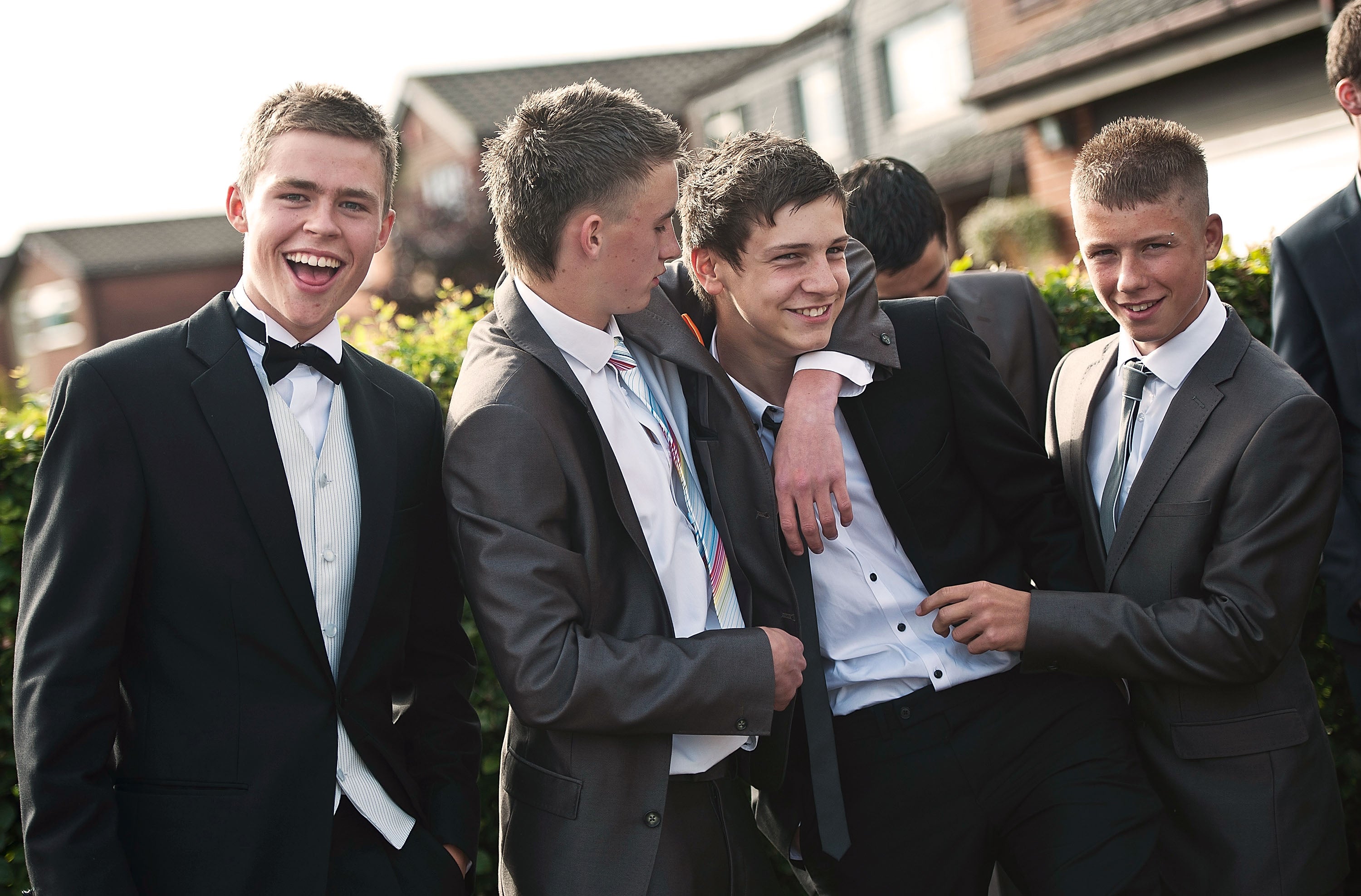How the school prom became a political hellscape – with even teachers deciding on the ‘in-crowd’
It was meant to be a fun rite of passage for teenagers to wave goodbye to their school years, but, says Eleanor Mills, the prom has descended into a vile ritual seeped in tension and exclusion – with even teachers taking sides on who is in and who is out


It’s bad enough getting the kids through exam season – the bitten fingernails, the stress-fuelled testing, those revision timetables that get more and more unrealistic… But if GCSEs and A levels weren’t trial enough, today there is a whole other summer-term horror rite of passage to navigate: the prom.
Last week, my niece, 15, came over. She’d already bought a beautiful dress from Anthropologie (not cheap) for her Year 11 prom, but she was after some accessories (and possibly hoping that her absent-at-uni older cousins might have an even better/sexier/trendier frock…).
We spent two hours trying on dresses, shoes, bags, necklaces and chatting about hair. Bless her, she’s 16 and could hardly think of anything else apart from what she was going to wear, who she’s going with, and the knotty politics of the after-prom party (the popular crew are all going to a super-swanky house with a pool…). In fact, it all seemed to be stressing her out way more than her actual exams.
She’s far from alone. Mumsnet is awash with threads about whether Darling Daughters and Darling Sons must go or risk social death, how much to spend on the dress, and whether or not a limo is really essential (though some kids apparently arrive by helicopter – which strikes me as really showing off!).
What began in the UK as an imported bit of ghastly Americana has, within a generation, become a stalwart of our kids’ summer scene. Before the arrival of this teenage hooley, our culture had next to no formal coming-of-age rituals (other than going to the pub and getting rat-arsed on your 18th birthday, and maybe receiving a key for the door at 21 – remember that?). But now the prom, with its fancy-pants dresses and Kardashian-style makeovers, has become the teen ritual – a kind of informal graduation ceremony after GCSEs and A levels – a first imprimatur of adulthood.
But it’s also a financial and social arms race. A recent survey for Go Compare found that the UK is spending £90m a year on prom: that’s £220 per girl and £157 per boy (in America, it’s an average of £650 per teen). Dresses cost from £50 to £500 and above; while boys’ suits cost £50 to rent or £150-plus to buy; a limousine costs £150 (but can be shared by up to six); professional prom make-up is £60; and add to this blow-dries, official photographs, and the ticket itself (around £30 but it depends on the school) – you can see why people start a prom savings fund sometimes a year in advance.
“There’s a lot of keeping-up-with-the-Joneses,” one mum in Tring told me. “Some of the mums were going prom dress shopping with their daughters before Christmas, or booking slots in wedding dress shops and spending a fortune. There’s been lots of questionable girly bonding, which I call maternal one-upmanship going on. Not to mention the diets, or the stress around spots… I feel really sorry for lots of the kids. The pressure is huge!”
Another parent I spoke to said that in their small town, the school hosts the prom, “which is reasonably democratic because nearly everyone goes,” but the problem comes afterwards, she says. “It’s fine for the school – they limit the amount of booze, it’s quite closely policed, and the kids tend to behave on school territory. The problem starts afterwards: the after-prom party. I was the host for my daughter last year and it was carnage. They all got into our garden and started mainlining vodka.
“Before I knew what was going on, there was a row of about seven puking 16-year-olds; the idiots were mixing their vodka with Smirnoff Ice (an alcopop). It was horrific – me with buckets and rubber gloves and sick everywhere. I felt responsible because I’d told other parents that I would be in charge, but it just got out of hand incredibly quickly…”

Whether you have or haven’t been invited to the after-prom party is only one way that the prom is becoming the deciding factor in whether you are one of the “ins” or “outs”; a have or have-not. Subtle rules decide the popular kids from the unpopular ones, for whom the prom has become a final reckoning to what has already probably been a pretty brutal and unkind school career. And as if this isn’t bad enough, the school staff are actively becoming part of the exclusionary nature of what was originally meant as a celebration for everyone.
Many schools now use attending prom as a reward for good behaviour.
This week, a school was accused of unfairly banning children from their prom in a “carrot and stick” approach over class attendance that has reportedly left dozens unable to go. Kepier Academy in Houghton-le-Spring, near Sunderland, told students last year that if they failed to hit attendance targets for each term they would not be eligible for the leavers’ party in June.
The criteria were 96 per cent attendance from September to January, 97 per cent from February to mid-March, and 100 per cent from mid-March to April. It also included requirements on behaviour and homework.
It’s now standard for many education trusts to insist on an attendance average of over 95 per cent for children to be allowed to attend the prom. This means that kids who have been “troublesome”, have poor attendance or have been excluded from school are not allowed to attend the prom.

In response to this, Kati Taunt, a consultant in trauma-informed practice who works with schools, social care, youth justice and CAMHS all over the UK, has set up a campaign called #dontpunishtheprom. This, she says, is to raise awareness of what she describes as “a huge injustice perpetrated on the most vulnerable children in our society – the ones who already feel like they aren’t good enough or don’t belong”.
She argues that although it sounds fair that prom should be a reward for hard work and good behaviour, “an arbitrary attendance measure is being used to reinforce exclusion.” She has seen many cases of kids with neurodiversity, homelessness, domestic violence or illness being forbidden from attending their school prom.
“Let’s take the story of a girl I’ll call Jane,” she says. “Her mum has breast cancer. The family is on benefits. Her brother is also ill. Jane was very close to her grandfather, who lived with them, but he died about six months ago. Jane is the only child from her family who is going to school, and she has considerable caring responsibilities.
“Jane can be difficult and her attendance is patchy. But Jane is also in a constant state of stress and trauma – worried about her mum, her brother, and grieving the loss of the only stable adult in her life...”
No matter how chaotic her home life had been, Jane had been really looking forward to the prom. “She told me it was going to be one of the only times in her life when she could wear a fancy dress and go to a big party and have her photo taken,” explains Taunt, “She had saved up and bought a second-hand prom dress, but because of her poor attendance and that she’d shouted at a teacher when she was stressed, she was excluded from prom. They wouldn’t even allow her onto school grounds to have her photo taken in her dress with all of her schoolmates.”

“It was devastating to her,” explains Taunt. “She’s a child who already feels like she doesn’t belong and isn’t good enough. It has really impacted her self-esteem – and this was a kid who was dealing with a huge range of issues anyway.”
Taunt believes that many children are being punished for absences, which are often due to family events that are out of their control.
“It’s easy for middle-class kids who are dropped off in a 4x4 to be on time for school,” she says. “What schools should be thinking about are the kids who are in survival mode, who aren’t thinking straight because mum at home is being beaten up, or they have to travel two hours to get to school because the family is in temporary accommodation. Feeling like you don’t belong is the biggest risk factor for kids ending up in gangs or anti-social behaviour.”
Tom Bennett, the government’s education tsar, is adamant that exclusion is the way forward, which Taunt believes makes a mockery of school environments run by professionals who pride themselves on their inclusive policies: “Schools should be about finding barriers for children and removing them, finding their unmet needs and meeting them – not punishing them for a lack of self-regulation which is often not their fault.”
So, as you get your Darling Daughter or Darling Son all dressed up and take the proud snaps, spare a thought for those who are once again being excluded from a key ritual of belonging – not just by their peers, but by the schools themselves.
Has the prom experience become too difficult for schools to handle? Let us know…
Join our commenting forum
Join thought-provoking conversations, follow other Independent readers and see their replies
Comments


Bookmark popover
Removed from bookmarks